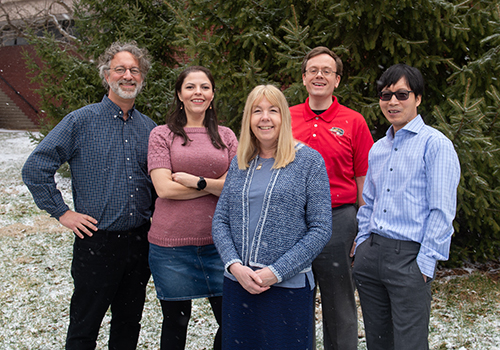 The National Science Foundation (NSF) has awarded $382,636 to Southern Illinois University Edwardsville for its collaborative GEOPATHS-EXTRA program. GEOPATHS will build pathways to careers in the geosciences through research experiences and internships that demonstrate the value of geosciences to society. Students will study local environmental problems and develop solutions that have the potential to contribute to global environmental challenges.
The National Science Foundation (NSF) has awarded $382,636 to Southern Illinois University Edwardsville for its collaborative GEOPATHS-EXTRA program. GEOPATHS will build pathways to careers in the geosciences through research experiences and internships that demonstrate the value of geosciences to society. Students will study local environmental problems and develop solutions that have the potential to contribute to global environmental challenges.
A team of SIUE researchers is leading the program, with collaborators from student co-curricular organizations and academic advisors. Sharon Locke, PhD, director of the SIUE STEM Center and associate professor in the Department of Environmental Sciences, is principal investigator (PI). Co-PIs include:
- Alan Black, PhD, assistant professor in the Department of Geography
- Ben Greenfield, PhD, assistant professor in the Department of Environmental Sciences
- Shunfu Hu, PhD, professor in the Department of Geography
- Adriana Martinez, PhD, associate professor in the Departments of Environmental Sciences and Geography
The SIUE GEOPATHS project aims to raise awareness of geoscience careers among students who are from groups underrepresented in the geosciences, including women, racial and ethnic minorities, veterans, persons with disabilities, and first-generation college students.
“Our vision is that students will develop early confidence in their scientific abilities, and a sense of belonging to the geosciences that will propel them toward degree attainment and successful careers,” said Locke. “The program will include activities designed to strengthen scholars’ science identity and belief in their ability to be successful in geoscience careers. As they progress through SIUE, they will participate in research with faculty mentors, training in geotechnical skills and extended field trips that show the excitement of these fields. We hope that they will then consider graduate school or enter the geoscience workforce.”
GEOPATHS Scholars will participate in storm chasing in early June with Black, whose research examines extreme weather. According to Black, “This type of field experience allows students to apply what they are learning in the classroom to the real-world. There is no substitute for studying storm conditions in real-time. The locations we travel to will depend on the weather patterns in the Midwest at the time of the trip.”
Students will also travel through the western United States for two weeks in July and August to observe geological processes in spectacular settings such as Yellowstone and Zion National Parks.
“Students will learn about the geologic history of landforms such as river canyons, geysers, hot springs and rock arches. They will also discuss how recent human impacts are changing the park environments,” said Hu, who will lead the summer experience.
Human-environment interactions are a major theme of the GEOPATHS project. “We anticipate that students will be studying important local issues such as soil and air pollution and their impacts on human health,” explained Greenfield, whose environmental health laboratory will be one of several sites for GEOPATHS Scholars’ undergraduate research experiences.
The team will recruit two cohorts of 10 students who will begin the program in their sophomore year and will be directly supported by NSF funding for a minimum of two years. In addition to extended field excursions and research, the GEOPATHS Scholars will receive training in geoscience technical skills and participate in local field trips and seminars that highlight the diversity of geoscience careers.
Martinez will train the scholars in the use of drones to study the environment, and support them to become certified drone pilots. “Throughout their two years in the program, students will learn technical skills that employers’ value,” said Martinez.
The researchers note the program’s potential impact on the community through outreach to schools and the public, and by sharing research findings on the impacts of flooding, hazardous weather and climate change.
“We are excited about and committed to advancing knowledge in the geosciences and diversifying the geosciences workforce through GEOPATHS,” said Locke. “The mentored undergraduate research in climate, rivers, watershed hydrology, and soils will increase understanding of the dynamics of coupled natural and human systems. Scholars will be able to use geosciences to contribute to community well-being, while developing skills they can use in their career.”
NSF funding for SIUE’s GEOPATHS program runs through June 2022. For more information and to apply for the program, visit siue.edu/STEM.
Photo: The GEOPATHS-EXTRA research team includes (L-R) Drs. Ben Greenfield, Adriana Martinez, Sharon Locke, Alan Black and Shunfu Hu.